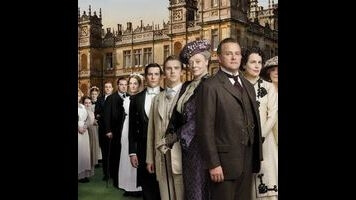Downton Abbey: "Episode 7"

After seven episodes, the absurdly addictive first season of Downton Abbey came to a close tonight. Across America, period-piece enthusiasts like me are weeping into our hand-embroidered hankies over the end of this witty, sumptuous drama from Gosford Park writer Julian Fellowes. Easily the most buzzed-about Masterpiece installment in years, Downton Abbey is irresistible because it takes a decidedly modern approach to a familiar—dare I say clichéd—story of love, class, and inheritance. Let us count the ways in which it is a superior period piece.
Downton Abbey portrays the Edwardian class system in a nuanced and complex way. As I discussed in my initial review, the series shows how intertwined the “upstairs” and “downstairs” worlds really are, despite the strict separation between them. The characters within both spheres are ambivalent about the rigid social order to which they must conform. Many of the servants have an especially complicated and even contradictory relationship to their roles in the world, both resenting and defending a system that relegates them to a lifetime of menial labor. For instance, when Matthew and Isobel first show up at Downton Abbey, O’Brien practically stages a mutiny, claiming “real gentlemen don’t work,” and threatening not to speak a civil word to her new master. It’s not that she really believes that the noble classes are inherently better than the masses. It’s just that if she’s now expected to serve someone who, himself, works—well, then, where does that leave her? O’Brien also scoffs at the trifling nature of her job—God forbid Cora should have to put her own comb through her own hair, she remarks at one point—but she also clings to it ferociously. O’Brien’s got a wicked mean streak, but she really only displays it when she feels that her small foothold is under threat.
Likewise, Thomas, for all his cruelty, is also the most clear-eyed about the dehumanizing effects of a life of service. After Cora loses her baby, Thomas isn’t quite sure what the big deal is. “Why must we live through them?” he asks. While his lack of sympathy—“they’re no bigger than a hamster at that point”—is extreme, Thomas does have a point. The staff is so invested in the intrigue upstairs precisely because they have been denied lives of their own. As melodramatic as it often is, Downton Abbey is grounded by psychological motivations that always ring true.
As has been widely noted, Downton Abbey is also full of delicious one-liners, most of which Maggie Smith, as the Dowager Countess Violet, gets to deliver. Fellowes gives her wonderful material—“What is a weekend?” “No Englishman would dream of dying in someone else's house,” etc.—and it’s hard to imagine anyone other than Smith delivering these lines with quite the same withering precision. Still, she's not the only actor who gets to lob the zingers. Fellowes has littered the script with dozens of cheeky double-entendres aimed squarely at the modern viewer. “One swallow doesn’t make a summer,” the Duke of Crowborough says to Thomas, meaning pretty much exactly what we think he means. Then there’s Pamuk, who warns Mary that “sometimes, we must endure a little pain in order to achieve satisfaction” hours before he deflowers her. Downton Abbey is that rare thing: a period piece that rewards those of us with prurient minds.

 Keep scrolling for more great stories from A.V. Club.
Keep scrolling for more great stories from A.V. Club.